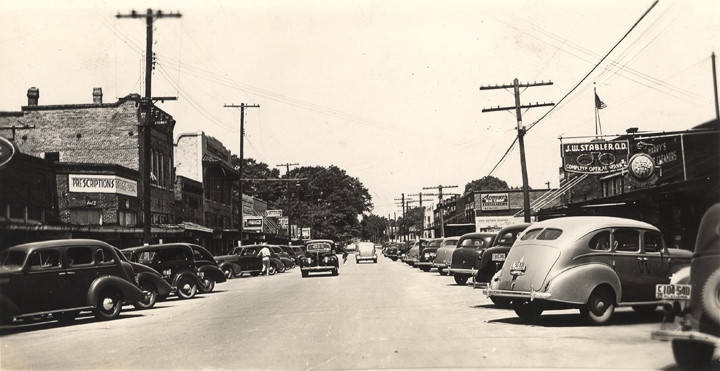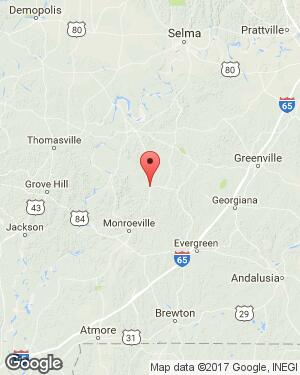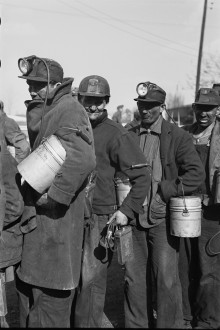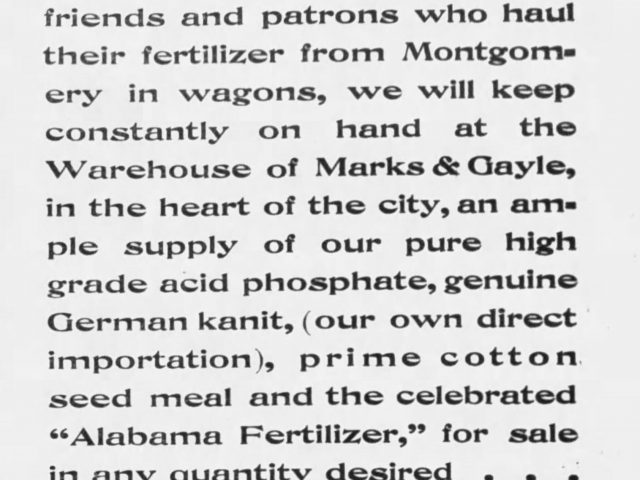Transcribed and unedited (with misspelled, capitals, and grammatical errors) written by WPA (Works Projects Administration) writer Annie L. Bowman, Escambia County, Alabama, March 31, 1939
Davison Fore
The Country Merchant
Atmore, Alabama
written March 31, 1939
by Annie L. Bowman
It was twenty minutes past nine in this crowded little country store. Davison Fore was sitting at his desk with a crowd of men sitting around him, giving him their order for tons of fertilizer that was being hauled from Pensacola for the farmers’ spring planting. He stopped and looked up to ask if I wanted anything. On being told that I would wait outside, he resumed his work, which kept him busily engaged for over an hour. After the trucks were on their way to Pensacola, he asked me in.
The profit is small but everything counts
“Well, yes ma’m, I am doing a slow but steadily increasing business. With spring planting going on it has kept me very busy supplying the farmers with fertilizer for their crops. I have been dealing with fertilizer for this farming section for ten years now. The profit is small, but a country merchant is like a farmer in some respects. He has to diversify his selling and make every little thing count to keep us moving along.”
 1930s business section on North Main Street in Atmore, Alabama (Alabama Department of Archives and History)
1930s business section on North Main Street in Atmore, Alabama (Alabama Department of Archives and History)
The neighbors will tell you that the reason they buy from him is that he always treats them fair and square in all their deals. He sells and hauls their fertilizer for them cheaper that they could get it from any other source. He only makes a small profit but does this to help the farmer, and there is not a better or a more accommodating merchant in Escambia County.
Davison Fore was born at Beatrice in Monroe County July 23, 1898. His father, Steven Fore, moved to Beatrice from Kentucky when a young man along with his father and mother who had sold out his home in Kentucky and bought a forty acre farm in Monroe County where he farmed and operated a gin until his death. He married Mary Francis Davison at an early age and there were twelve children, three of whom are dead and there are nine living. They are scattered all about Alabama.
 Location of Beatrice, Monroe County, Alabama
Location of Beatrice, Monroe County, Alabama
Continued to run the farm and gin for a time
After his father’s death, they continued to run his father’s farm and gin until all his brothers and sisters married and moved away and left only Davison and his baby brother Woodrow. His oldest brother was killed in the Battle of The Marne; and his mother was so grieved over his father and brother that she became dissatisfied and sold out and moved to Escambia County where she bought five acres of land – on which she built a small store.
Mr. Fore continued the conversation by saying, “I was always store-minded when a little fellow. During ginning season I had a big wood box which I made a set of shelves out of. I stocked this with candy, cakes, crackers and canned goods. I would sell this to the farmers that came to my father’s gin and it wasn’t long before I found that I could make profit with this. I kept this up until I stocked up several wood boxes. Then we moved here to Escambia.”
While talking with him you find that he had no money to start this business with; and had to borrow it from his mother. They had only five acres of land which was not enough to farm. His store opened its doors to the public the first Saturday in November 1922 and has faithfully continued to stay open. It is five miles from any other store. This is his reason for his success although in 1932 he considered himself a broke man; but he didn’t give up hope.
They were Baptists for years
He said that they had always been Baptists as far back as his great-grand-father. When he first moved here, he attended the B. Y. P. U. The first Sunday night he met the girl of his dreams. He had no chance to be introduced, but fate was in his hands. She came in a wagon with her father and he, being a stranger in the crowd, was shy and felt out of place. He was walking ahead when the mule ran away with her father and he had the honor of jumping on board as they came by at a terrific rate, stopping them so quick that Doskie fell all over him. Of course, he had to drive home for them and you know the rest. Doskie Bozeman was his first and only sweetheart. Not being financially able to marry then, they had a two-year courtship and were married November 22, 1925.
He was still in debt to his mother, but he had married a farmer’s daughter and a hard worker. They made a trade with his mother for three acres of land and built a very small but comfortable home, and by careful saving and close economy, they managed to pay every cent they owed to his mother in three years and were able to enlarge their dwelling and have a larger stock of goods in the store.
During this time, two children were born in this home and they were accumulating a very comfortable living until the depression hit them so hard in 1930; business began to fall off and those that came to the store had no money. It was then he and his wife Doskie made a contract between them to do without anything, only the barest necessities for themselves to help their friends and neighbors. They had no idea how long this would last but they could not turn away the needy.
They sacrificed for others during the Great Depression
Their neighbors will tell you that if every two people sacrificed themselves for others it was these two. It was no uncommon sight to see people going there for groceries they would have to have and promising him they would do their best to pay him when they could find any work to do, and Davison asking them to economize for he was getting lower every day. They will tell you that Davison has never mentioned this to anyone. They know that during the depression he had carried several as much as five hundred dollars each. The smaller debts which he knew he would never get was never entered on the books.
Doskie asked me to sit with her as her husband was busy in the store. She was preparing the midday meal and I went in from the front through the house to the kitchen. She says that she can’t quit work for her two older children are in school and will be home at twelve for dinner. Her baby girl was playing in the yard and she had to make time while she was out for when she came in she claimed all her time. She had washed that morning was her excuse for not having the house straight as it should be. She was a comely looking girl with a tendency to gossip.
Woodrow did not work
She began by telling me about Woodrow, her brother-in-law, who had married a year ago. She says that they don’t know what to do with him, as he had always lived with his mother until he married this girl with low morals. Mother Fore wouldn’t have this girl in the house. He has no work of any kind and expects Mother Fore and Davison to take care of him like they have always done. When Jim Fore was killed in the Battle of The Marne, he had his life insurance for his mother and naturally if you are inclined toward loafing you would expect them to dish money out to you. How does he live? Why he stays with her people. They are just tenant farmers and there isn’t much to divide. If he would work, we would give him all the help he needed.
She tells you that they intend to give their children all the advantages of an education. Her two older children will be in high school next year and we hope to send them through college if they don’t get marriage in their heads like she did.
She says she had a hard time when they were broke. She couldn’t get Davison to close the store. It almost closed itself as there was scarcely anything left to sell or give away. You find as she continues that if Roosevelt had failed to provide relief for the people, they would have had to close up. After their customers began to get work, they would pay a little on their old accounts and would trade with them and pay cash. It wasn’t long before they had restocked their store and were beginning to gain ground again.
He had to mortgage property
At this time their store and dwelling had so long been neglected that it was impossible to put it off any longer. Money was scarce and he went to the bank and mortgaged his all for enough to recover both buildings, painted and patched them up. Then began a long series of economizing. Although they had been accustomed to this so long it went hard with Doskie. She wanted a new car. She couldn’t get out of sight with the old one fearing it would break down. She was expecting a new baby soon and her nerves were all unstrung.
After the baby came she got back to her normal health and neither one of them has had to have a doctor since. She laughs and says that her health is too good to be a lady.
Davison and the children came in to dinner, which was served on the kitchen table, which consisted of corn muffins, sweet potatoes, turnip greens and rich sweet milk.
Bad partnership
He tells you after he had gained and paid his debts he decided he would like to spread out a little. He purchased a lot, built and stocked another general store in the little Station of Canoe, which came very near laying him flat again. He says he didn’t have a very good insight to human nature or he would never have picked this so called friend to run this store for him. One of his brothers ran it awhile until he found something better to do. Then he hired this man, a so called friend, to work for him. Well, he had it open for a year and he losing money all the time. When it collapsed he found this man had continually been carrying unperishable (sic) things home at night, locking them up in a room. He opened up with my stock in another building in three days after he left, but I had to take my medicine and it left me pretty flat.
He paused and looked thoughtful, and with his slow drawling voice, continued. “I was afraid to venture again and I might unconsciously cook the goose that laid the golden egg. Many a good man has succeeded unusually well for some years and then to his own surprise fade out. Sometimes it has been because he didn’t understand some vital reason for his previous good fortune. He didn’t have fully opened eyes.”
He says that “to be safe, then, let’s assume that in the midst of your prosperity you really are in a little danger. And then let’s check the success order with the tag, so to speak, and see if some item is being overlooked in the delivery.”
He has before him some items in the success order displayed and those are the ones that particularly appealed to him: Modernized store, concentrated buying, loyalty to dependable brands, attractive and open displaying, emphasis on fresh fruits and vegetables, courteous treatment, efficient accounting, persistant (sic) and well-thought-out advertising.
Good clerks important
He says a force of good clerks is like a good digestion – likely to miss its just share of conscious appreciation until it is lost!
“If your clerks are really good – people like to meet old friends. Another thing, when people deal with the same clerks over a considerable period they become less price conscious. Good clerks mean more business – and more profit on a given volume.”
He says though this is hard to do in a country general store after he made such a failure in Canoe, he determined to put all his time and energy on his store here at home. He takes the Merchant Weekly and tries to develop his selling technique, but using some of their ideas. He thinks there are some people who can’t be pleased but you must please them to a reasonable way. If you are the loser at times, always give them the benefit of a doubt.
Neighbors helped build up this store
“These people here, my neighbors, have helped me to build up this store and I claim it is most through them that I have prospered. They have helped me by being good customers, and I tried to do my part when they were in need.”
He tells me of his one known enemy in his neighborhood whom he had advanced one summer until his crop was made. James Smith, a political boss, or so he thinks, found out was for the New Deal and Roosevelt. James made his brags that he would turn him, or he wouldn’t pay him what he owed. He came to the store for groceries for his wife and several children. Davison let him have the groceries. James told him he would regret his political views. He didn’t give it much thought. He traded on and at the end of the year he made good his word and refused even an honest talk. Davison tried every way for a settlement, but he goes by with his face averted. He doesn’t care now and is glad he found out about him before he used him further. He does everything he can against him and Davison doesn’t want him for a friend.
He has to keep a close watch out for the trend of the market. A few times he got left by buying when the market is fluctuating and to do this he takes two daily papers. He doesn’t wait for the mail carrier to bring these. He either sends or goes himself to town five miles away early in the morning for his papers.
He says he has studied the wants of all his customers, and if he fails to have what they want, he doesn’t let them leave the store but sends some one elsewhere after this article.
“Yes, of course, the ladies go elsewhere to get their finer clothes. I always keep just the standard kind of cloth.” I also sell friendliness as well as food and clothes.”
Additional notes:
Davison Fore didn’t know it when it happened, but being ‘fired’ was the best thing that ever happened to him! He knows it today, however, and so would you if you could see his store. He was fired from his first job as helped in carpenter work as being incompetent. From the two hundred and fifty dollars he borrowed from his mother in 1922, he has with all his discouragement built himself up to ten thousand dollars a year business. His honesty has caused him to be held in high esteem and a leader in the community in which he lives.
He is a tall well-built man, weighing one hundred and sixty-five pounds. He walks with a slow moving easy grace and stands erect. His hair is light brown with a tiny sprinkle of grey. His eyes are grey and he is very fair. He speaks with a long slow easy drawl like he is afraid he might say the wrong thing. He has a habit of twisting his head to one side as he talks. He wears cotton clothes, a blue shirt and pin checked pants, and is always spotlessly clean.
Doskie is a low stout built girl, not given to being fat. She weighs one hundred and thirty pounds. She stands erect and steps quickly. Her hair is black and curly. Her eyes are a deep blue. She is very dark and has a well modulated voice. She has no characteristic gestures. She dresses neatly in print dresses while at home.
This is a farming community, the citizens own their farms with the exception of their tenant farmers. They are good substantial people of the progressive type. There is a three room school that carries them through the third grade. The county furnishes a school but to carry those who have finished this grade to town to the grammar and high school.
It boosts a Baptist church, as most of the community are of the Baptist faith. Those that belong to other denominations go five miles in their cars or trucks to worship in their own faith.
The house is composed of six rooms, three on each side with no connecting hall between. A large front porch that extends all the way across the front. It is painted white and covered with green composition roofing. The parlor, dining room and kitchen are on one side and three bedrooms on the opposite side. The parlor has a rug, living room suite, a floor lamp, and radio. The dining room has a silk rug, a dining room suite and an old time chandelier lamp that hangs from the top of the ceiling. The kitchen was equipped with a wood range, two tables, a closet that was attached to the walls. A bright colored linoleum covered the floor.
TRANSCRIBER’S NOTE – Davison Fore passed away March 20, 1993 and is buried in Robinson Church Cemetery in Atmore, Alabama (Find A Grave Memorial# 32234657). His wife Doskie died Dec. 30, 1993 and is the same cemetery in Atmore. (Find A Grave Memorial# 32234656)
Once Alabama was admitted as a state of the United States of America on December 4, 1819, a great wave of immigrants from other states and countries came by flat-boats, pack-horses, covered wagons and ships to become the first citizens of the state. ALABAMA FOOTPRINTS Statehood presents the times and conditions Alabama first citizens faced in lost & forgotten stories which include:
- Who Controlled And Organized The New State of Alabama?
- Tuscaloosa Had Three Other Names
- Chandelier Falls & Capitol Burns
- Alabama Throws Parties For General LaFayette
- Francis Scott Key Was Sent to Alabama To Solve Problems
- General Jackson’s Visit to Huntsville For A Horse Race Created Discord At Constitutional Convention
READ EBOOKS FOR FREE ON YOUR COMPUTER!
- FIRST CLICK ON THIS LINK AND DOWNLOAD THE FREE APP: Amazon.com – Read eBooks using the FREE Kindle Reading App on Most Devices
- THEN SIGN-UP FOR THE 30-DAY FREE TRIAL BELOW:
Join Amazon Kindle Unlimited 30-Day Free Trial
Get the Daily Update from Alabama Pioneers
Don’t miss out on Alabama history, get our daily updates in your email.





Gaye Davis King. An Atmore article!